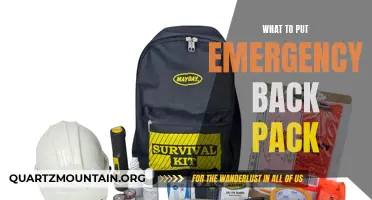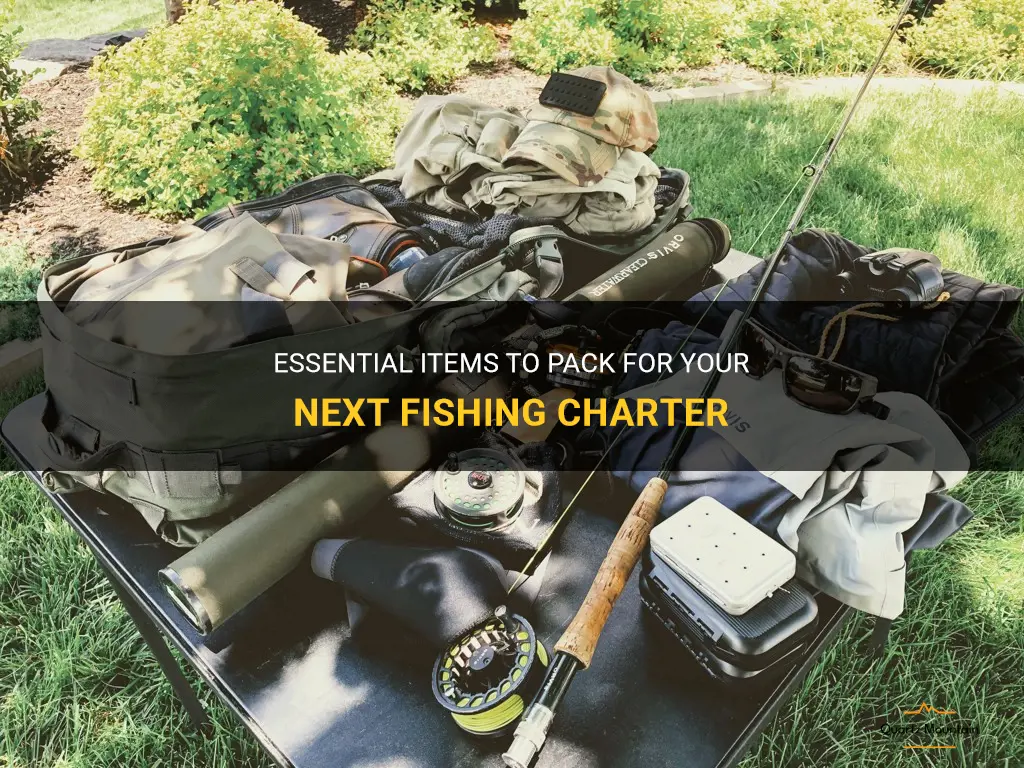
Planning a fishing charter can be an exciting adventure, whether you're a seasoned angler or new to the sport. However, before casting your line into the deep blue, it's important to ensure you have all the essential items packed to make the most of your fishing charter. From fishing gear to sun protection, this guide will highlight the must-have items to pack for a successful day on the water. So grab your tackle box, put on your sunscreen, and get ready to reel in the big catch on your next fishing charter.
What You'll Learn
- What are the essential items to pack for a fishing charter?
- How should I dress for a fishing charter?
- Are there any specific items I should pack for different types of fishing charters?
- What kind of fishing gear should I bring on a fishing charter?
- Are there any personal items or medications I should remember to pack for a fishing charter?

What are the essential items to pack for a fishing charter?
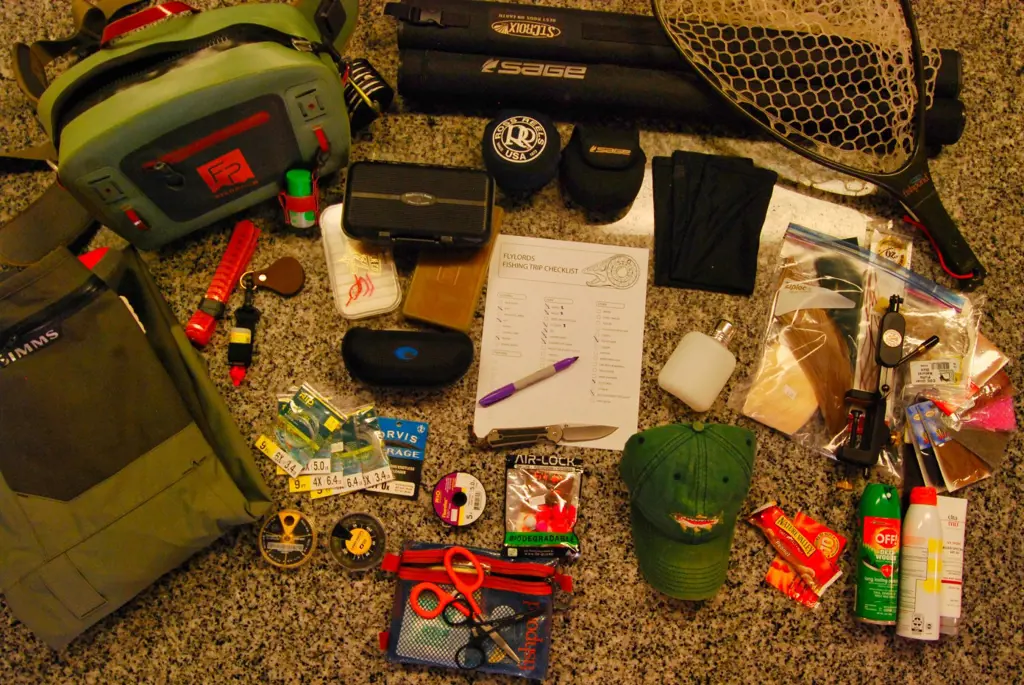
Going on a fishing charter can be an exciting and enjoyable experience. Whether you are an experienced angler or a beginner, it is important to pack the right items to ensure you have a successful and comfortable trip. Here are some essential items to consider packing for your fishing charter.
- Fishing Rods and Reels: Make sure to bring your own fishing rods and reels, as most fishing charters provide basic equipment but may not have high-quality gear suited to your preferences. It is also a good idea to bring a spare rod in case of breakage.
- Tackle Box: Pack a tackle box with a variety of fishing tackle, including hooks, sinkers, bobbers, and lures. Different fish species have different preferences, so having a variety of options will increase your chances of success.
- Fishing Line: It is always a good idea to have extra fishing line on hand. You never know when your line might get tangled or break, and replacing it quickly is essential to keep fishing.
- Bait: Check with your fishing charter operator to see if they provide bait or if you need to bring your own. Live bait such as worms, minnows, or shrimp is often effective, but artificial bait can also work well for certain fish species.
- Sun Protection: Spending hours on the water can expose you to harsh sunlight. Pack sunblock with a high SPF rating to protect your skin from harmful UV rays. Don't forget to bring a hat, sunglasses, and lightweight, long-sleeved clothing to protect yourself from the sun.
- Snacks and Water: Fishing can be physically demanding, so it is important to stay hydrated and maintain your energy levels. Pack plenty of water and nutritious snacks such as granola bars or fruit to keep yourself fueled throughout the day.
- Cooler: If you plan on keeping your catch, it is essential to have a cooler to store your fish. Make sure the cooler is large enough and has enough ice to keep your fish fresh until you get back to land.
- First Aid Kit: Accidents can happen even on a fishing charter, so having a basic first aid kit is important. Include items such as bandages, antiseptic ointment, and pain relievers in your kit.
- Camera: Don't forget to capture your fishing charter experiences by bringing a camera or a waterproof smartphone. You might want to take photos of your catch or simply capture the beautiful scenery and memories.
- Proper Clothing: Dress in layers, as weather conditions can change quickly when out on the water. Bring a rain jacket, as well as warm clothing for early mornings or cooler evenings. Also, wear non-slip shoes or boots to ensure stability on the boat.
Remember to check with your fishing charter operator beforehand to see if they have any specific recommendations or additional items you should bring. By packing these essential items, you will be well-prepared for a successful and enjoyable fishing charter.
Essential Items for Men to Pack When Traveling to France
You may want to see also

How should I dress for a fishing charter?
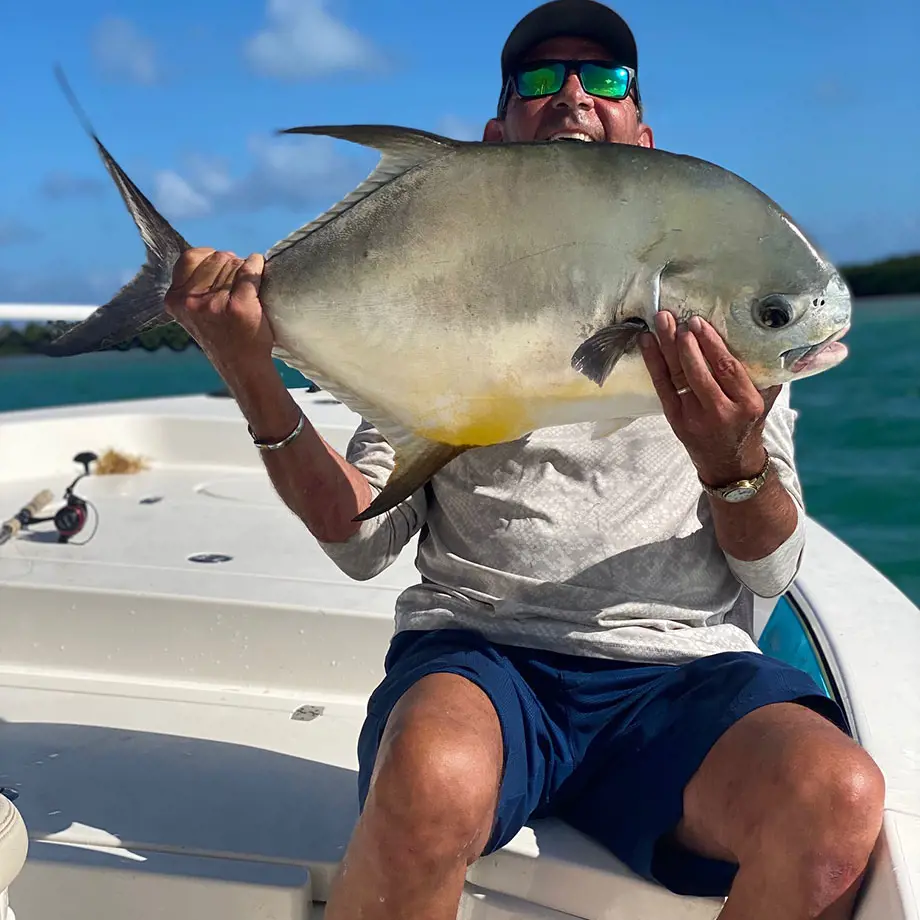
When going on a fishing charter, it's essential to dress appropriately to ensure your comfort and safety throughout the trip. The right attire will not only protect you from the elements but also help you have a more enjoyable experience. Here's how you should dress for a fishing charter:
- Dress in layers: The weather can change quickly while out on the water, so it's best to dress in layers. Start with a moisture-wicking base layer to keep you dry, then add a lightweight long-sleeved shirt or hoodie for sun protection. Depending on the weather, you may also want to bring a waterproof and breathable outer layer such as a jacket or rain gear.
- Wear comfortable clothing: Opt for loose-fitting and comfortable clothes that allow you to move freely. Avoid wearing restrictive or tight clothing as it may limit your mobility while reeling in fish. Choose breathable fabrics that dry quickly to avoid feeling clammy or chilled if you get wet.
- Protect yourself from the sun: Fishing charters often involve spending long hours under the sun, so it's important to protect yourself from harmful UV rays. Wear a wide-brimmed hat to shade your face, ears, and neck. Don't forget to apply sunscreen with a high SPF rating to exposed skin and wear polarized sunglasses to protect your eyes from the glare on the water.
- Choose appropriate footwear: Fishing charters can be wet and slippery, so it's crucial to wear appropriate footwear. Opt for closed-toe shoes or boots with non-slip soles to ensure good traction and protect your feet from fishing gear or sharp objects on the boat. Avoid wearing flip-flops or sandals, as they offer little to no protection.
- Bring a hat and sunglasses: In addition to protecting your face, a hat will also help keep the sun out of your eyes. Look for a hat with a strap or clip to prevent it from being blown away by the wind. Polarized sunglasses will not only protect your eyes from harmful UV rays but also improve your vision by reducing glare and allowing you to see fish beneath the water's surface.
- Pack a backup set of clothes: It's always a good idea to pack an extra set of clothes in case you get wet or need to change. Accidents happen, and it's better to be prepared. Make sure to pack your spare clothes in a waterproof bag or container to keep them dry and easily accessible when needed.
- Consider the location and time of year: The type of clothing you wear may vary depending on the location and time of year. If you're fishing in colder waters or during the winter months, you may need to wear thermal layers, insulated jackets, and waterproof pants. On the other hand, fishing in warmer climates may require lighter and more breathable clothing.
Remember, it's always a good idea to check with the fishing charter company for any specific dress code or recommendations they may have. By dressing appropriately, you'll be able to enjoy your fishing charter to the fullest while staying comfortable and protected.
Essential Items to Pack for a Week-Long Adventure on a Catamaran
You may want to see also

Are there any specific items I should pack for different types of fishing charters?
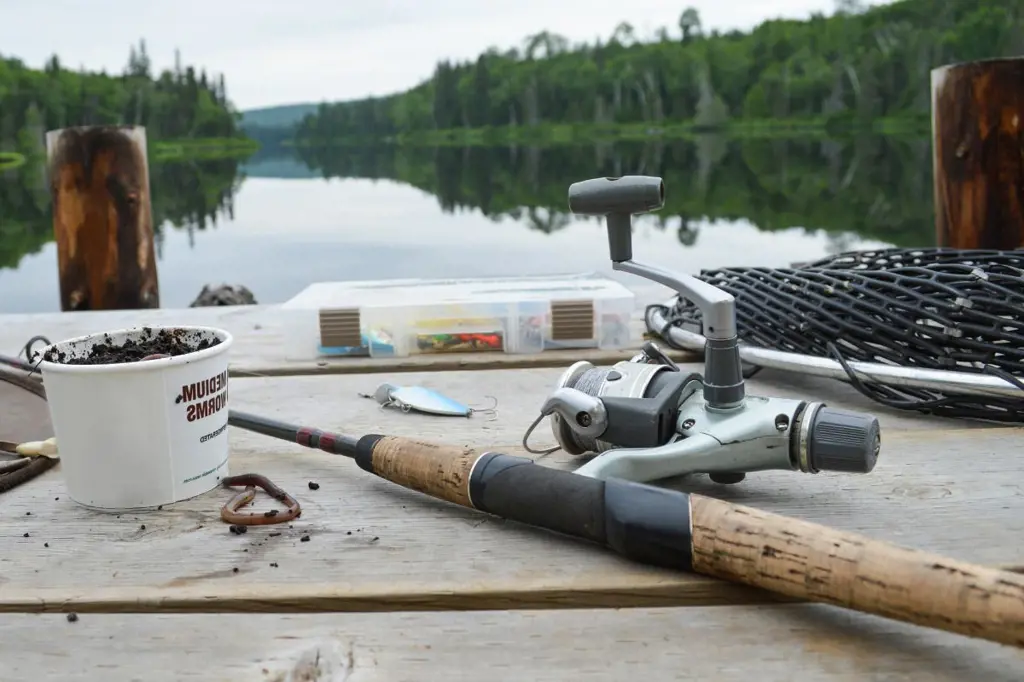
When preparing for a fishing charter, it is important to pack the right equipment and supplies to ensure a successful trip. The specific items you should pack can vary depending on the type of fishing charter you are going on. Whether you are going deep-sea fishing, freshwater fishing, or fly fishing, here are some items you should consider packing for each type of fishing charter.
Deep-Sea Fishing:
- Fishing Rods and Reels: Pack sturdy and durable fishing rods and reels that can handle the big fish and the rough conditions that can be encountered in deep-sea fishing. It is always a good idea to have backup rods and reels as well.
- Tackle: Pack a variety of different tackle, including hooks, sinkers, swivels, and leaders. Make sure to bring different sizes and types of tackle to accommodate different fish species.
- Bait: Live bait, such as squid or shrimp, is often used in deep-sea fishing. Make sure to pack enough bait for the duration of your trip.
- Safety Equipment: It is important to pack safety equipment for deep-sea fishing. This can include life jackets, a first aid kit, a VHF marine radio, and a flare gun.
- Food and Water: Deep-sea fishing charters can last for several hours or even a full day. Pack enough food and water to stay hydrated and energized throughout the trip.
Freshwater Fishing:
- Fishing Rods and Reels: When packing for a freshwater fishing charter, consider the type of fish you will be targeting and pack the appropriate rods and reels. Lighter tackle is often used for freshwater fishing.
- Tackle: Pack a variety of different tackle, including a selection of hooks, sinkers, and artificial lures. It is a good idea to research the fish species you will be targeting and pack the tackle that is most effective for catching them.
- Bait: Depending on the type of fish you are targeting, live bait or artificial lures may be used. Pack a selection of both to increase your chances of success.
- Fishing Line: Freshwater fishing often requires lighter fishing line, so make sure to pack extra line to replace any that may break or become tangled.
- Fishing License: Before heading out on a freshwater fishing charter, make sure to obtain the necessary fishing license for the area you will be fishing in. This is important to ensure you are fishing legally and avoid any fines or penalties.
Fly Fishing:
- Fly Rods and Reels: When packing for a fly fishing charter, make sure to pack the appropriate fly rods and reels for the type of fish you will be targeting. Different fly rods are designed for different casting distances and fish sizes.
- Flies: Pack a selection of different fly patterns to match the insects or baitfish that are present in the water. It is important to have a variety of sizes and colors to increase your chances of enticing the fish to strike.
- Fly Line: Fly fishing requires specialized fly line that matches the weight of your fly rod. Make sure to pack extra fly line in case of breakage or wear and tear.
- Waders and Boots: Depending on the fishing conditions, waders and boots may be necessary for fly fishing. They allow anglers to access areas of the water that are not easily reached from the shore.
- Polarized Sunglasses: Fly fishing often involves spotting fish in the water, and polarized sunglasses can help reduce glare and improve visibility.
Remember to always check with your fishing charter operator for any specific equipment or supplies they may recommend. Packing the right items for your fishing charter can greatly enhance your chances of having a successful and enjoyable fishing experience.
Essential Gear and Supplies for an Unforgettable Bow Hunting Trip
You may want to see also

What kind of fishing gear should I bring on a fishing charter?
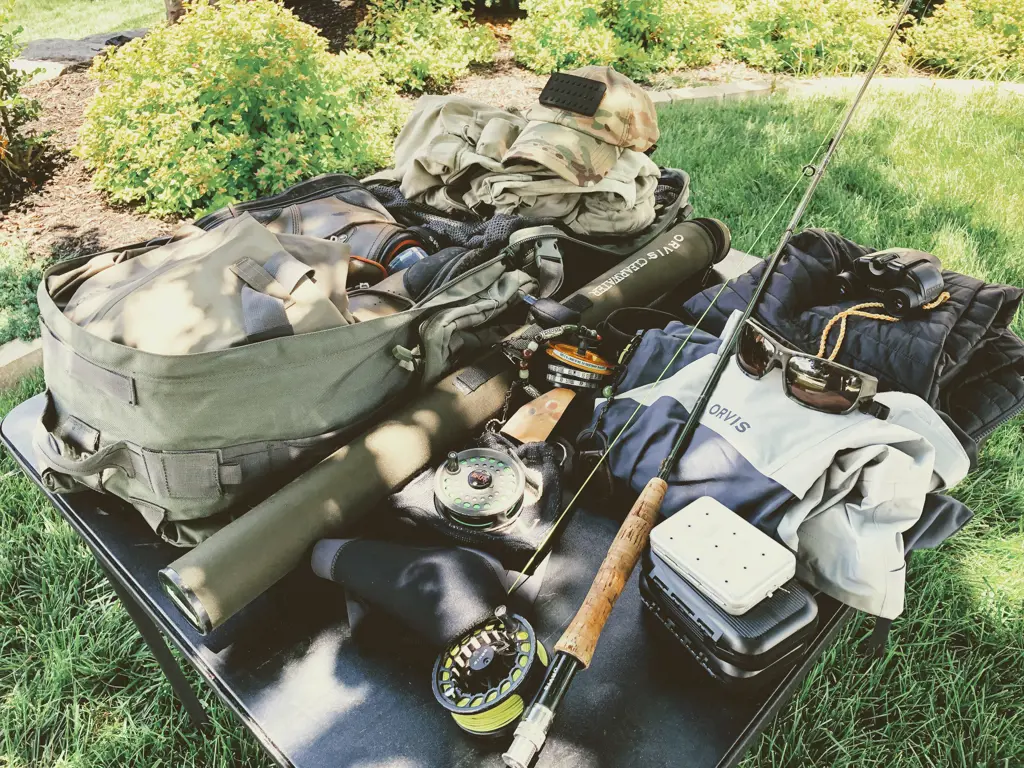
Whether you're an experienced angler or a first-time fisherman, going on a fishing charter is an exciting adventure. To make the most of your trip, it's important to bring the right gear. Fishing charters can vary in terms of target species and fishing techniques, so it's essential to know what kind of fishing gear to bring. Here are some important factors to consider when packing for your fishing charter.
- Research the Fishing Charter: Before your trip, do some research on the type of fishing charter you'll be going on. Find out what species are commonly targeted and what fishing techniques are used. This information will help you determine the appropriate gear to bring.
- Consult with the Captain: Once you've booked your fishing charter, reach out to the captain or crew to get more specific information about the trip. They will be able to provide insights into the type of gear that is most effective for the location and target species.
- Fishing Rods and Reels: A key component of your fishing gear will be your fishing rods and reels. For most fishing charters, a medium-heavy to heavy-action rod paired with a spinning or baitcasting reel will suffice. The specific length and power of the rod will depend on the species you're targeting and the fishing techniques used.
- Terminal Tackle: Terminal tackle refers to the various items attached to the end of your fishing line, such as hooks, sinkers, and swivels. It's a good idea to bring a variety of sizes and types to accommodate different fishing conditions. Some fishing charters may also require specific types of terminal tackle, such as circle hooks for catch-and-release fishing.
- Fishing Line: It's essential to have a strong and durable fishing line on your reels. Braided lines are popular due to their high strength and low diameter, allowing you to cast farther and feel even the slightest bites. However, monofilament or fluorocarbon lines may be more appropriate depending on the fishing conditions and target species.
- Bait and Lures: Depending on the fishing charter, bait and lures may be provided or available for purchase on the boat. However, it's always a good idea to bring a selection of your own. Consult with the captain or crew to determine the most effective baits or lures for the target species.
- Safety Equipment: Safety is paramount on a fishing charter, so be sure to bring any necessary safety equipment. This may include life jackets, sun protection such as sunscreen and a hat, and any medications you may need. It's also a good idea to bring a first aid kit in case of minor injuries.
- Comfort Items: Fishing charters can be long days on the water, so it's important to bring comfort items to make your trip more enjoyable. This may include snacks, drinks, a cooler, a comfortable chair or cushion, and appropriate clothing for the weather conditions.
- Follow the Regulations: Before heading out on your fishing charter, familiarize yourself with the local fishing regulations. This includes knowing the size and bag limits for the target species, as well as any seasonal closures or special regulations. Adhering to these regulations will help preserve fish populations for future generations.
In conclusion, bringing the right fishing gear on a fishing charter is crucial for a successful and enjoyable experience. Research the charter, consult with the captain, and pack the appropriate rods, reels, terminal tackle, bait, and safety equipment. By being prepared, you'll increase your chances of landing a great catch and create unforgettable memories on your fishing charter.
What to Pack for a Colorful Summer in Colorado
You may want to see also

Are there any personal items or medications I should remember to pack for a fishing charter?
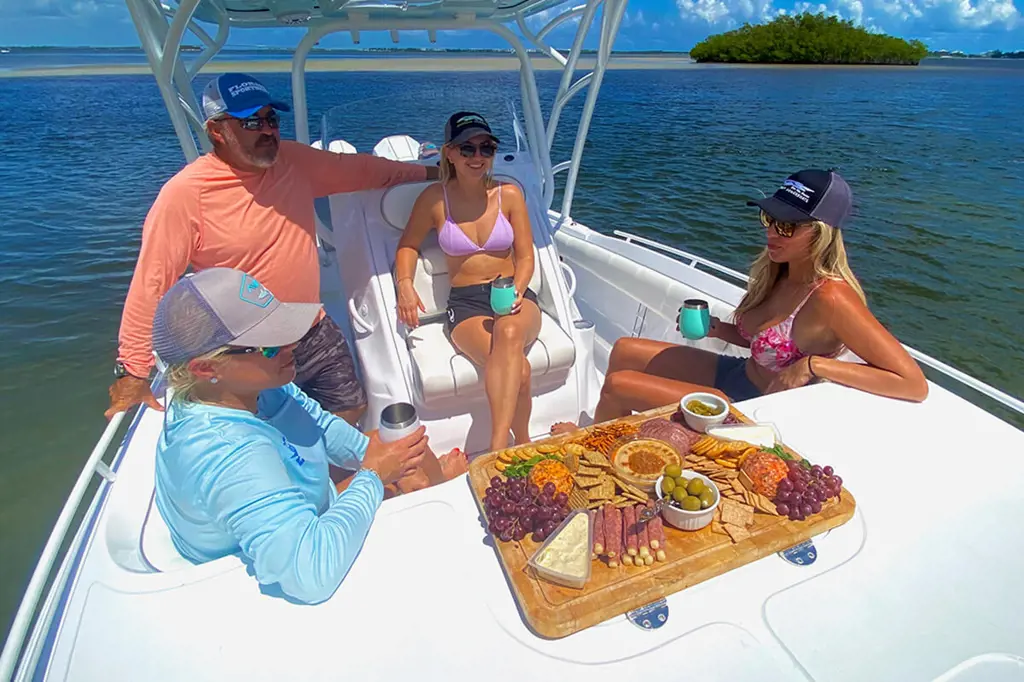
When you're planning to go on a fishing charter, there are a few personal items and medications that you might want to remember to pack. These items can enhance your experience and ensure that you have a comfortable and enjoyable trip. Here are some things you should consider bringing with you:
- Sunscreen: Spending a day out on the water can leave you exposed to the sun's harmful rays. It's important to protect your skin by applying sunscreen regularly. Look for a sunscreen with a high SPF (at least 30) and don't forget to reapply throughout the day. You should also bring a hat and sunglasses to further protect your face and eyes.
- Motion sickness medication: If you're prone to motion sickness, it's a good idea to bring some medication along. The rocking of the boat can sometimes trigger nausea and dizziness, and having medication on hand can help alleviate these symptoms. Consult with your doctor to find the best option for you and follow the instructions for dosing.
- Extra clothing layers: Weather conditions can change quickly when you're out on the water, so it's a good idea to bring along some extra clothing layers. Even if it's a warm day, it's always a good idea to have a lightweight jacket or sweatshirt on hand in case the temperature drops or if you're out early in the morning or late in the evening when it can be cooler.
- Any necessary medications: If you take any prescription medications or have any specific medical needs, be sure to pack enough to last you for the duration of your fishing charter. It's always better to be prepared and have extra medication on hand rather than running out while you're out at sea. If you have any concerns, it's best to speak with your doctor before your trip to ensure you have everything you need.
- Personal snacks and drinks: While many fishing charters provide food and beverages, it's always a good idea to bring some personal snacks and drinks with you. This way, you can ensure you have something to munch on throughout the day, especially if you have any dietary restrictions or preferences.
- Camera or smartphone: You'll likely want to capture some memories of your fishing charter, so don't forget to bring a camera or smartphone to take photos and videos. Make sure you have enough storage space on your devices or bring an extra memory card so you don't miss any special moments.
- Fishing gear and tackle: Depending on the fishing charter you're going on, you may need to bring your own fishing gear and tackle. Check with the charter company beforehand to see if they provide equipment or if you need to bring your own. If you're unsure, it's always better to ask and be prepared.
Remember to pack these personal items and medications for your fishing charter to ensure you have a comfortable and enjoyable experience. Being prepared with essential items can make a big difference in your overall satisfaction and enjoyment of the trip.
Essential Items to Pack for an Unforgettable Trip to Armenia
You may want to see also
Frequently asked questions
When packing for a fishing charter, it is important to bring items such as fishing rods and reels, bait, fishing line, hooks, and sinkers. These are the basic tools needed for fishing. Additionally, it is important to pack sunscreen, a hat, sunglasses, and appropriate clothing for the weather conditions. It is also a good idea to bring some snacks and drinks to keep yourself nourished throughout the day.
It depends on the charter you choose. Some fishing charters provide all the necessary fishing gear, including rods, reels, lines, and bait. Others may require you to bring your own equipment. It is best to check with the charter beforehand to see what is provided and what you need to bring.
When packing for a fishing charter, it is important to consider the weather conditions. If you are fishing in warm weather, it is best to wear lightweight and breathable clothing such as shorts and a t-shirt. It is also important to bring sunscreen, a hat, and sunglasses to protect yourself from the sun. If you are fishing in colder weather, it is best to wear layers and bring a warm jacket. It is also important to bring rain gear in case of inclement weather.
In most cases, you do not need a fishing license for a fishing charter. The captain of the charter usually holds a valid fishing license that covers all passengers on the boat. However, it is always best to check with the charter beforehand to ensure that you do not need to obtain a fishing license on your own.







